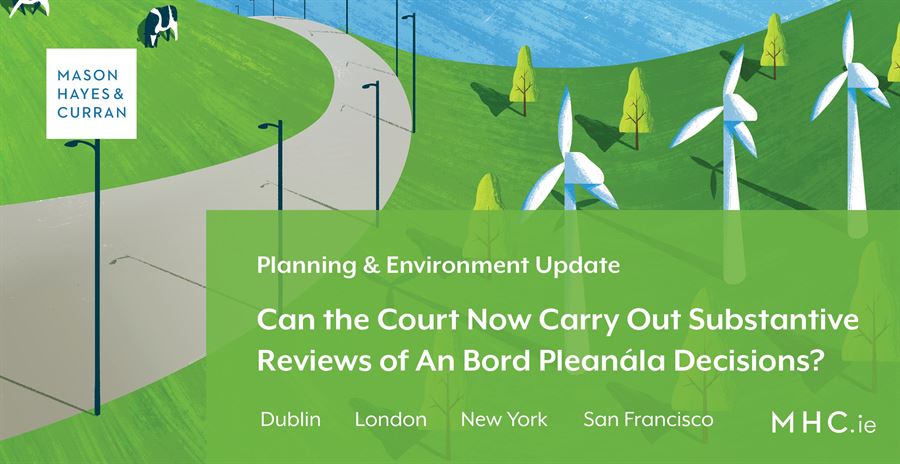
The High Court held in May 2019 that a decision of An Bord Pleanála (the Board) to grant planning permission for a development of an “anaerobic digester plant” was invalid[1] (the Initial Judgment). The Board recently sought to appeal this decision to the Court of Appeal on the basis that the High Court substantially reviewed the Board’s decision. This application for leave was rejected by the High Court on 15 May 2020. This means that the law of review of the Board’s decisions is as outlined in the Initial Judgment. The Initial Judgement appears to look substantively at the Board’s decision, which could have wide reaching affects for decisions made by the Board.
The Board requested an appeal of the Initial Judgment on the basis:
“Is the O’Keeffe standard of review to be applied on the basis of the Court’s own analysis and understanding of the technical material on which the decision-maker made its decision, or is the question to be asked whether the technical material was capable, on analysis by a decision maker with relevant scientific expertise, of supporting the decision reached?”
 Standard of review principles
Standard of review principles
The Board argued that the Court’s application of the principles in the Initial Judgment represents a “significant shift” in the established case law.
Under the O’Keeffe principles, a Court cannot carry out a “substantive review” of the material in order to form a view as to whether the material can uphold the conclusion of the expert decision-maker. The Court cannot substitute its own views for that of the decision-maker. Although the Court can review that the material relied upon by the decision-maker is what it says it is, the Court cannot “drill down” into the material.
Permission decision overturned
In granting permission for the proposed development, the Board had to decide if the proposed development represents a “lower-tier establishment” for the purposes of the Seveso III Directive. If it was such an “establishment”, the Board had to comply with certain requirements under the Planning Regulations as imposed by the Control of Major Accident Hazards (COMAH) Regulations 2015.
In order to analyse this, the Board engaged an expert which resulted in the Byrne Ó Cléirigh Consulting report (BOC report). In this report a condition was suggested to ensure that the proposed development fell below the category of a “lower-tier establishment”. The Board subsequently granted permission for the proposed development subject to a condition that the Initial Judgment says fell short of that recommended in the BOC report. The Court found that there was a material error of fact in the Board’s decision as the Board appears to have thought that it was attaching a condition “as recommended” by the BOC report but in fact the condition did not go as far as that contained in the BOC report. The Court also concluded that there was no material before the Board capable of supporting its decision that the proposed development was not likely to exceed the 10,000 tonnes threshold.
The Board argued that they had sufficient information to make the decision and that:
“It is acknowledged that the conclusion drawn was less tentative than that contained in the BOC report referred to above, nevertheless this was a rational and informed judgement on our behalf, informed by the documentation before us as well as our knowledge and understanding of how AD facilities work.”
On this basis, the Board sought leave to appeal the Initial Judgment to the Court of Appeal querying how the O’Keefe principles should be applied. Even if the Court purports not to “drill down” into their substantive decision making, can the Court review the technical material on their own understanding? As a result, can the Court decide in their view whether or not the material supports the decision-maker’s decision or does the material only need to be capable of supporting the decision-maker’s decision?
Appeal denied
The High Court decided, in dismissing the application to appeal the Initial Judgment, that the Initial Judgment used the established O’Keefe principles in its decision. It decided that the material available before the decision-maker was incapable of supporting the Board’s decision that the proposed development was not likely to exceed the 10,000 tonnes threshold. The Court also found that there was a material error of fact in the Board’s decision. This was rooted in the fact that the Board appeared to have thought that it was attaching a condition “as recommended” by the BOC report but in fact attached a less far reaching condition. The Court stated that this was within the well-established O’Keefe principles. Since the law is not uncertain, the Court concluded the point of law raised is not of ‘exceptional public importance’ and therefore the matter could not be appealed to the Court of Appeal.
Conclusion
Although the Initial Judgment appears to apply the O’Keefe standard of review, the judgment does appear to go beyond investigating whether there was sufficient material available for the Board to come to its decision.
The Court found that the material before the Board was inadequate to allow it to reach a definitive determination that there was no likelihood of the 10,000 tonnes threshold being exceeded. This is despite the Board’s expert view that the material before it was sufficient.
For more information on the important development, contact a member of our Planning & Environment team.
The content of this article is provided for information purposes only and does not constitute legal or other advice.
[1] Halpin v. An Bord Pleanála [2019]




